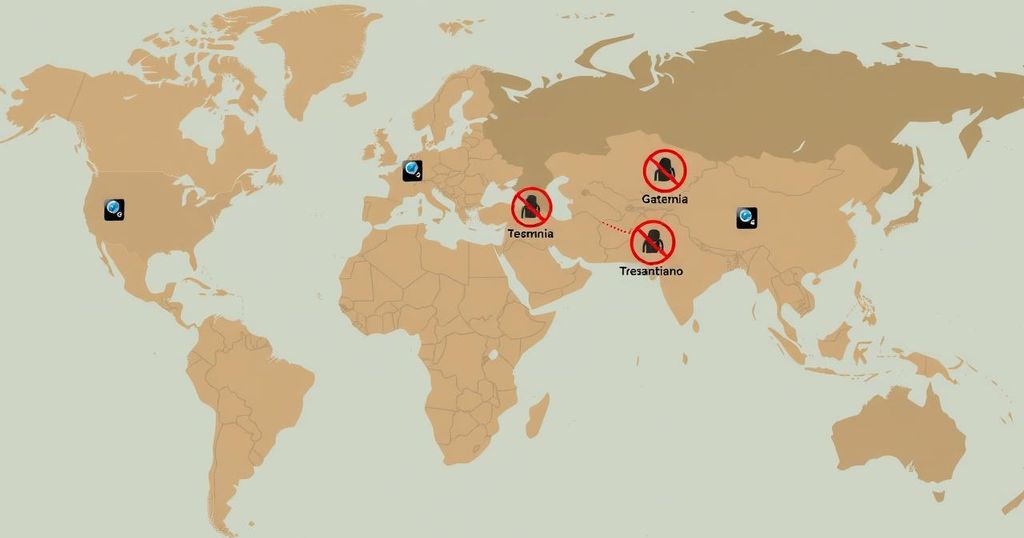Trump’s Travel Ban: Understanding the Restrictions on Twelve Countries
President Donald Trump’s new travel ban affects twelve countries, primarily in Africa and the Middle East, citing national security concerns related to terrorism and visa overstays. This measure, effective Monday, includes partial restrictions for seven additional countries. The justification encompasses accusations of insufficient governance, terrorism links, and failures in document issuance.
A travel ban recently issued by President Donald Trump is slated to impact twelve countries predominantly situated in Africa and the Middle East. This significant measure will take effect on Monday, effectively barring individuals from these nations from entering the United States. Additionally, seven other countries will face partial travel restrictions. The president has framed the initiative as a necessity for national security, pointing to a recent attack on the Jewish community in Colorado, purportedly perpetrated by an Egyptian individual, although Egypt itself does not appear on the banned list.
In his proclamation, Trump highlighted Afghanistan, citing its control by the Taliban, which he categorizes as a Specially Designated Global Terrorist group. Notably, Trump had previously suggested improvements in Afghanistan’s conditions, evidenced by his administration ending Temporary Protected Status for Afghans residing in the U.S. Since then, concerns over Afghanistan’s ability to issue valid travel documents and reports of visa overstays have contributed to its inclusion on the ban list.
The proclamation also points fingers at Iran, dubbed by Trump as a state sponsor of terrorism. The administration’s narrative positions Tehran as a significant source of global terrorism while accusing it of meddling through proxy groups, including Hamas and Hezbollah. This proclamation arrives amid tense negotiations between the U.S. and Iran surrounding the latter’s nuclear capabilities.
Turning to Africa, Somalia is labeled a “terrorist safe haven,” according to Trump, who emphasizes the Somali government’s inability to maintain control over its territory. He argues this weakness hampers the nation’s capacity to effectively manage its legal and immigration systems. Similarly, Libya faces scrutiny due to its historical terrorist links, posing risks to Americans.
Haiti also features on the list, as Trump claims that, during the Biden administration, the U.S. saw significant illegal immigration from the Caribbean nation. This influx, according to him, led to criminal enterprises and rampant visa overstays. Data inform that over 852,000 Haitians were living in the U.S. as of February 2024, with many originating from the turmoil caused by the devastating earthquake in 2010.
Countries like Chad, Congo-Brazzaville, and Equatorial Guinea are flagged largely for their high rates of visa overstays, per Trump’s administration. The Department of Homeland Security categorizes an “overstay” as individuals remaining in the U.S. past their permitted admission period. Chadians, notably, have a probable overstay rate of 49.54% for business or tourist visas, according to a DHS report.
Myanmar, grouped alongside Chad in the proclamation, similarly faces accusations of high overstay rates and a lack of cooperation regarding repatriation efforts for Burmese nationals. Likewise, Eritrea, Sudan, and Yemen are called out for their inadequacies in issuing valid travel documents, as well as for high numbers of visa overstays, significant security concerns, and ongoing conflicts.
Meanwhile, partial restrictions apply to another set of seven countries including Venezuela, criticized for its passport issuance mishaps, and Cuba, labeled a “state sponsor of terrorism” due to its historical ties. The administration cites issues surrounding the acceptance of deportees and visa overstays for several other nations, including Burundi, Laos, Sierra Leone, Togo, and Turkmenistan, marking an expanded effort to tighten immigration policy.
The travel ban enacted by President Trump impacts twelve countries categorized as security risks, primarily in Africa and the Middle East. These nations face various accusations from terrorism sponsorship to high visa overstay rates, emphasized as core justifications for this restrictive measure. Additionally, seven other nations endure partial restrictions, further illustrating the administration’s strategy to bolster immigration controls, as framed under national security. Consequently, the implications of this travel ban and its rationale could incite substantial discussions concerning its efficacy, legality, and humanitarian impact.
Original Source: www.bbc.com




Post Comment